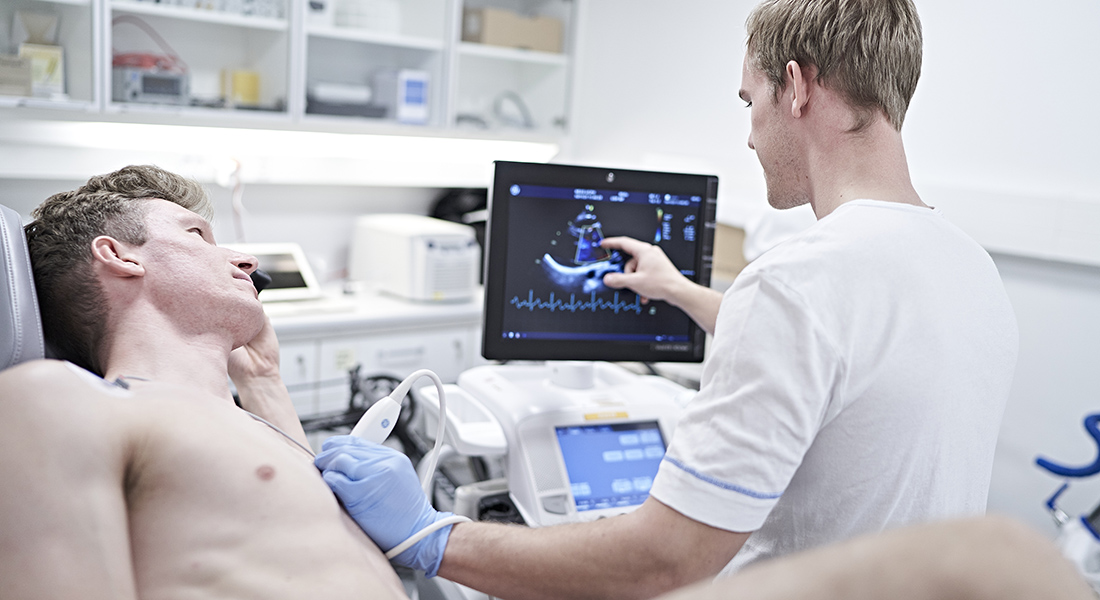Universitetsavisen
Nørregade 10
1165 København K
Tlf: 21 17 95 65 (man-fre kl. 9-15)
E-mail: uni-avis@adm.ku.dk
Ph.d.-forsvar
Ph.d.-forsvar — PhD thesis: The capacity to modulate cardiac output to meet an increased metabolic rate or respond to changes in vascular pressures is crucial for optimal exercise performance as well as to adapting to environmental or pathological stress. While heart rate alterations contribute to the adjustment of cardiac output, the adaptations in maximal cardiac output primarily occur through functional and morphological adaptations that impact stroke volume.
Date & Time:
Place:
Auditorium 1, August Krogh Building, Universitetsparken 13, DK-2100 Copenhagen, Denmark
Hosted by:
Department of Nutrition, Exercise and Sports, University of Copenhagen
Cost:
Free
Our research aimed to elucidate the functional changes that occur with short- and long-term training interventions as well as the effects on cardiac function with acute exercise and exercise training.
The studies in this thesis include various ‘healthy’ subjects ranging from sedentary individuals with a peak oxygen uptake of 18 ml/kg/min to elite athletes with 78 ml/kg/min. In postmenopausal women, we found that cardiac mass and function, when matched for lean body mass, were not different between sedentary individuals and well-trained subjects. In addition, classical markers associated with improved cardiac function showed some association with fitness, but not at group levels. However, a clear discrepancy was evident in the estimated stroke volume needed for the measured maximal oxygen uptake (VO2max), suggesting that resting cardiac function were inadequate at revealing the functional capacity of the trained hearts. This indicates a more complex interplay between physical fitness and cardiac dimensions than previously recognized, underscoring the importance of selecting appropriate metrics for assessing cardiac adaptations. This novel finding underpins the pitfalls of echocardiographic assessment of cardiac function in otherwise healthy individuals. This assessment may be improved by assessing cardiac function during acute stress which challenges cardiac function.
A strong association between functional markers and heart rate were found and revealed that the morphological adaptations of the athletes’ hearts are not reflected when stressed in relation to relative workloads (i.e. normalized to heart rate) but instead are reflected with absolute workloads (i.e. normalized to absolute power output watt). Additionally, filling rate emerged as a valuable tool for distinguishing between trained and untrained individuals. Lastly, the studies revealed that training interventions, both in untrained and highly trained subjects, can yield alterations with just a few weeks of exercise training. In untrained subjects, improvements in cardiac function were predominantly evident during stress at absolute load (75w) intensities, with limited effects observed when assessed by relative workloads (i.e., heart rate 140 BPM).
In conclusion, this thesis reveals that even a brief period of exercise training can enhance cardiac function in both sedentary and highly trained individuals. Importantly, the findings highlight that current indexing practices result in skewed comparisons due to limited insights from the assessment of resting cardiac function. Furthermore, exercise stress testing emerges as valuable in enhancing functional assessment, especially when evaluating differences between groups.
2024, 172 pages.
Opponents
Associate Professor Thomas Elbenhardt Jensen (chair), Department of Nutrition, Exercise and Sports, University of Copenhagen, Denmark.
Chief Physician and Clinical Lector Hanne Kruuse Rasmusen, Bispebjerg-Frederiksberg Hospital and Department of Clinical Medicine, University of Copenhagen, Denmark.
Consultant and Vice Chair for Research Professor Michael J. Joyner, Department of Anesthesiology and Perioperative Medicine, Mayo Clinic, Rochester, Minnesota, USA.
Principal Supervisor
Professor Lars Nybo, Department of Nutrition, Exercise and Sports, University of Copenhagen, Denmark.
Co-supervisor
Associate professor Lasse Gliemann, Department of Nutrition, Exercise and Sports, University of Copenhagen, Denmark.
External supervisors
Professor Eric J. Stöhr, Institute of Sport Science, Leibniz University Hannover, Germany.
M.D., PhD. Jesper J. Linde Department of Cardiology, The Heart Centre, Rigshospitalet, University of Copenhagen, Denmark.
